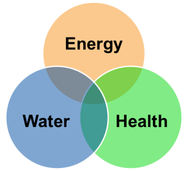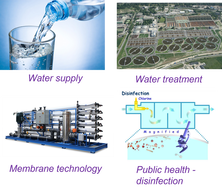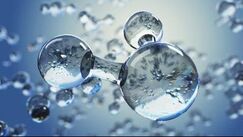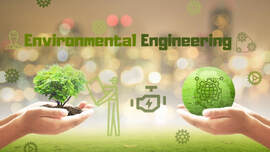
CIVE 530: Environmental Engineering at the Water-Energy-Health Nexus
This course covers key principles and applications of state-of-the-art technologies at the water-energy-health nexus. Students will be exposed to emerging technologies that produce clean water and energy from unconventional water resources such as wastewater and saline water, as well as novel approaches that prevent water-borne diseases beyond conventional disinfection.
The dual challenges of water and energy shortage in the context of a changing climate motivate technological evolution at the water-energy-health nexus. The state-of-the-art technologies are shifting the focus from traditional water and wastewater treatment to water purification and energy generation from various unconventional resources such as seawater, brackish water, and industrial wastewater. Also, nanotechnology provides new approaches that protect public health beyond conventional disinfection processes. Accordingly, there is an urgent need for students in environmental-related disciplines to capture this technological evolution, in order to prepare for a better professional career. Therefore, this course aims to provide the students with necessary knowledge on the most updated technologies at the nexus of these critical underpinnings of society.
This course covers key principles and applications of state-of-the-art technologies at the water-energy-health nexus. Students will be exposed to emerging technologies that produce clean water and energy from unconventional water resources such as wastewater and saline water, as well as novel approaches that prevent water-borne diseases beyond conventional disinfection.
The dual challenges of water and energy shortage in the context of a changing climate motivate technological evolution at the water-energy-health nexus. The state-of-the-art technologies are shifting the focus from traditional water and wastewater treatment to water purification and energy generation from various unconventional resources such as seawater, brackish water, and industrial wastewater. Also, nanotechnology provides new approaches that protect public health beyond conventional disinfection processes. Accordingly, there is an urgent need for students in environmental-related disciplines to capture this technological evolution, in order to prepare for a better professional career. Therefore, this course aims to provide the students with necessary knowledge on the most updated technologies at the nexus of these critical underpinnings of society.

CIVE 541: Physical Chemical Water Treatment Processes
This course will provide necessary knowledge for the students to work in the water industry, including theory and practice of separations and conversions in water treatment processes. The lectures will cover reactor theory, sedimentation, filtration, adsorption, mass transfer, oxidation, membrane technologies, disinfection, and the application of nanomaterials. The students will gain both qualitative and quantitative knowledge to design and manage water treatment processes by taking this course.
This course will provide necessary knowledge for the students to work in the water industry, including theory and practice of separations and conversions in water treatment processes. The lectures will cover reactor theory, sedimentation, filtration, adsorption, mass transfer, oxidation, membrane technologies, disinfection, and the application of nanomaterials. The students will gain both qualitative and quantitative knowledge to design and manage water treatment processes by taking this course.

CIVE 538: Aqueous Chemistry
Most water-related processes, including biogeochemical cycling, contaminant transformation and environmental remediation, and wastewater treatment, involve various chemical species and reactions. As a result, aqueous chemistry is at the core of addressing problems associated with the water environment. The purpose of this course is to introduce the students to the theoretical framework needed for predicting the chemical composition and understanding chemical processes in natural water matrices, soil solutions, and wastewaters using chemical equilibrium concept. By taking this course, the students gain the capability of tackling various chemistry-related engineering problems including (but not limited to) contaminant remediation, water supply, resource recovery, and wastewater treatment.
Most water-related processes, including biogeochemical cycling, contaminant transformation and environmental remediation, and wastewater treatment, involve various chemical species and reactions. As a result, aqueous chemistry is at the core of addressing problems associated with the water environment. The purpose of this course is to introduce the students to the theoretical framework needed for predicting the chemical composition and understanding chemical processes in natural water matrices, soil solutions, and wastewaters using chemical equilibrium concept. By taking this course, the students gain the capability of tackling various chemistry-related engineering problems including (but not limited to) contaminant remediation, water supply, resource recovery, and wastewater treatment.

CIVE 438: Fundamentals of Environmental Engineering
This comprehensive course covers core topics of Environmental Engineering including water quality and chemistry, wastewater removal and treatment, air pollution, noise pollution, and sanitary landfill design. Contents of engineering ethics are also discussed. This course is also designed to help students obtain a better score at the Environmental and Sanitary Engineering sections of the FE and PE Exams.
This comprehensive course covers core topics of Environmental Engineering including water quality and chemistry, wastewater removal and treatment, air pollution, noise pollution, and sanitary landfill design. Contents of engineering ethics are also discussed. This course is also designed to help students obtain a better score at the Environmental and Sanitary Engineering sections of the FE and PE Exams.